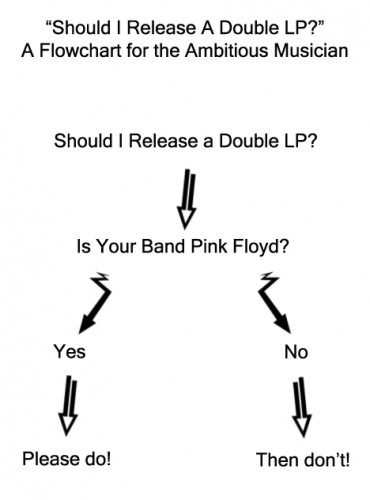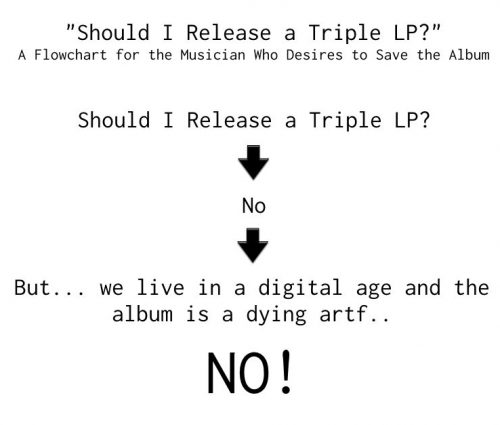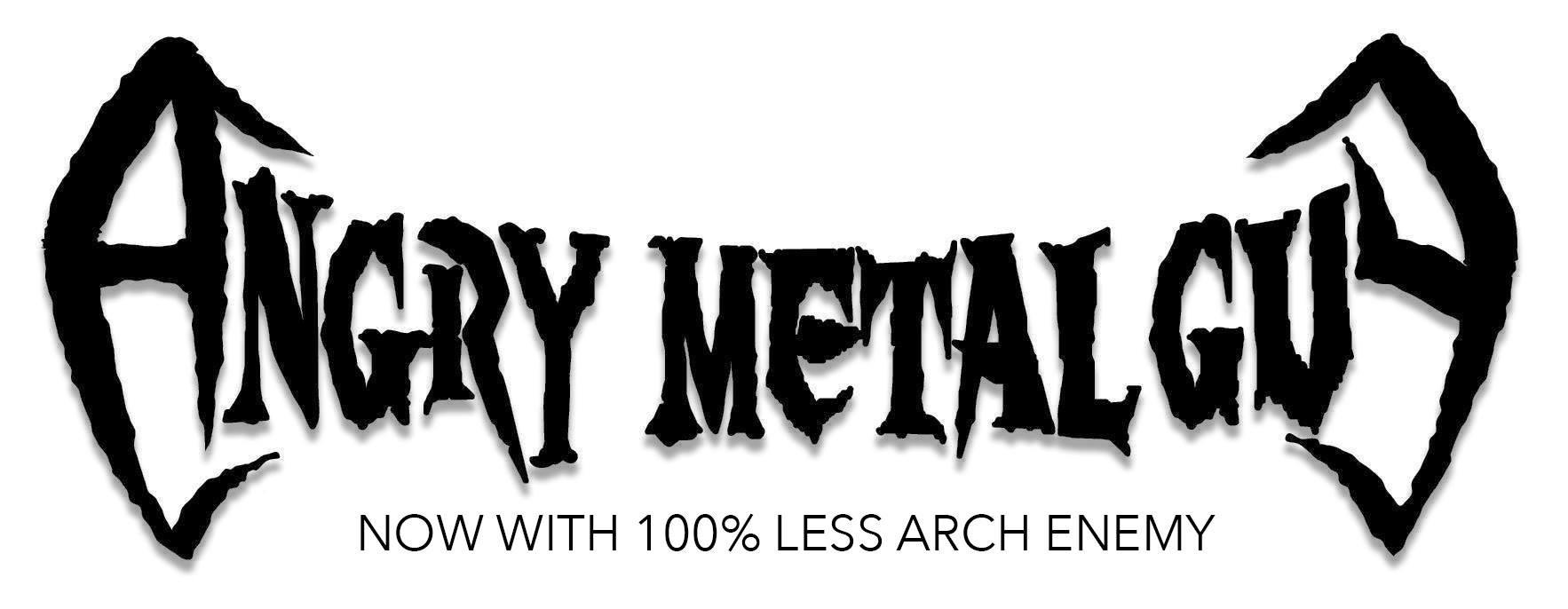 I’ve written fairly extensively on my opinion about album lengths. I, rather infamously, gently panned the new Iron Maiden album because it was delivered totally unedited. I wrote about how the CD was the death of the album, and I wrote about why I think that a quintuple LP has failed from the outset. This has since taken on the name “The 45 Minute Rule.” This rule of thumb garners pushback for reasons that are understandable. First, people argue, the album is a work of art. Setting arbitrary boundaries for length defeats the freedom of expression available to artists. Second, others argue that it’s a matter of quantity—bang for your buck, so to speak—and that longer records are better as a matter of course. Indeed, in the true spirit of metal, they land in the Yngwie Malmsteen camp: “How can less be more?! That’s impossible!” Third, people point to magnum opi or exceptional albums which are very long and very good. These records, they say, are proof that having a “45 Minute Rule” is just plain wrong. There is merit to every single one of these points but I want to clarify what an album is, why length matters, and what it precisely is that we review here at Angry Metal Guy.
I’ve written fairly extensively on my opinion about album lengths. I, rather infamously, gently panned the new Iron Maiden album because it was delivered totally unedited. I wrote about how the CD was the death of the album, and I wrote about why I think that a quintuple LP has failed from the outset. This has since taken on the name “The 45 Minute Rule.” This rule of thumb garners pushback for reasons that are understandable. First, people argue, the album is a work of art. Setting arbitrary boundaries for length defeats the freedom of expression available to artists. Second, others argue that it’s a matter of quantity—bang for your buck, so to speak—and that longer records are better as a matter of course. Indeed, in the true spirit of metal, they land in the Yngwie Malmsteen camp: “How can less be more?! That’s impossible!” Third, people point to magnum opi or exceptional albums which are very long and very good. These records, they say, are proof that having a “45 Minute Rule” is just plain wrong. There is merit to every single one of these points but I want to clarify what an album is, why length matters, and what it precisely is that we review here at Angry Metal Guy.
I’ll start by pointing out that points one and two from above contradict each other. As a “work of art,”1 I want artists to produce coherent, holistic albums. This is not the same thing from lining up 10 songs you wrote in a specific order that works pretty well. For me, the peak of the album is Seventh Son of a Seventh Son or The Wall. When I start The Wall I listen to it front to back and I enjoy the whole experience. Similarly, Seventh Son of a Seventh Son or Symphony X’s V: The New Mythology Suite. These are albums that use the form to create something cohesive and should a band need 75 minutes to do that, more power to them. The key, though, is immersion. Listeners lose themselves in the music and the album is akin to looking at a painting. Sure, you could look at the left half now and the right half later, but a painting is meant to be seen in its totality. Such albums are usually carefully crafted so as to be continuously interesting and engaging; both as composition and narration. The best album-as-whole is the record that has likely been heavily edited because it needs to be perfect. This is Wintersun’s particularly neurosis (see also: Turisas’ The Varangian Way) and these albums drive their creators nuts. As with great film or great writing, great music is well-edited. Unlike great film or great writing, the editing is almost entirely self-imposed and artists are notoriously attached to their work and unable to “kill [their] darlings.”
 Bands producing records that are long because they can is different. Releasing the 15 songs I wrote in the last 18 months without consideration for time and space is not constructing an album. This is, rather, a playlist. There are plenty of great records that are playlists; in fact, I think most albums that are released are simply playlists.2 But that changes expectations. In this case, there will be varying compositional quality and it behooves bands to remove the worst material to improve the flow and feel of their playlist. Historically, this meant sitting down and cutting down to the LP length. And while this is hard, anyone who makes music knows that we all write stuff that we don’t like as well. We all produce music that we think is subpar, even if we like this riff or that idea. The musician who wants to produce the best album possible will either re-write those pieces or drop them. They edit.
Bands producing records that are long because they can is different. Releasing the 15 songs I wrote in the last 18 months without consideration for time and space is not constructing an album. This is, rather, a playlist. There are plenty of great records that are playlists; in fact, I think most albums that are released are simply playlists.2 But that changes expectations. In this case, there will be varying compositional quality and it behooves bands to remove the worst material to improve the flow and feel of their playlist. Historically, this meant sitting down and cutting down to the LP length. And while this is hard, anyone who makes music knows that we all write stuff that we don’t like as well. We all produce music that we think is subpar, even if we like this riff or that idea. The musician who wants to produce the best album possible will either re-write those pieces or drop them. They edit.
Playlist albums are more likely to be repetitive at longer lengths, particularly if they lack dynamics. I love Amon Amarth, but those guys write pretty much the same songs for every album. They’re really good at it, but a 75 minute Amon Amarth album would fall absolutely flat. By the 40-minute mark, you’ve heard everything you’re going to hear and at that point you’re pretty much ready to move on. You’ll see them live, of course, but then they play 120 minutes of their best material, not their most recent.
 Sometimes you’ll encounter albums where every song is great but it’s super long, making it enjoyable in two sittings. But is that a successful album? My answer is no. A successful album is something that you want to hear in a single sitting. Generally, the most successful albums are the ones which end before you’re ready. The ones that leave you wanting more. I review new albums on these terms. When enjoyable records crest at 55, 60, or 70 minutes and I’m bored, I consider it an editing problem. An album with plenty of interesting sections but that falls flat on a total listen is a failure which could have been averted with better editing.3 I’d say the same thing of a 30 minute album that I was bored with by the end, too. It’s the whole that matters.
Sometimes you’ll encounter albums where every song is great but it’s super long, making it enjoyable in two sittings. But is that a successful album? My answer is no. A successful album is something that you want to hear in a single sitting. Generally, the most successful albums are the ones which end before you’re ready. The ones that leave you wanting more. I review new albums on these terms. When enjoyable records crest at 55, 60, or 70 minutes and I’m bored, I consider it an editing problem. An album with plenty of interesting sections but that falls flat on a total listen is a failure which could have been averted with better editing.3 I’d say the same thing of a 30 minute album that I was bored with by the end, too. It’s the whole that matters.
Do we harp on this point a lot? Well, we talk about it more than most. Following (or around the time of) Opeth, bands began seeing song length as its own virtue. Why this is I can only speculate, but that this happened is undeniable. I cannot tell you4 the number of records we get where every song is pushing 10 minutes and where there isn’t nearly enough material to hold it together. Some bands have been successful with it—like Opeth or Moonsorrow—but most bands aren’t composing symphonies, they’re just repeating riffs ad nauseum. Because of this, albums are getting out of control in length and unless it’s the best material of their life, it just fades to gray. Yet it becomes more common all the time.
Ultimately, I think that records that bloat make for bad records and that labels are releasing fewer good records because of it. If you’re a person who doesn’t enjoy albums as a whole, then this isn’t a problem. But what are we to do when we review? Our job is to review albums. That means pointing out the strengths and weaknesses of the whole product that we’re reviewing. Since we judge them as single units, rather than rating how much we like each song and creating a composite score, length risks dropping scores due to dropping quality. There will always be exceptions. There are some bands who can pull it off. Sometimes editing actually even hurts an album as a whole. But given the literally thousands of albums that we receive every year, I feel entirely comfortable saying that most of them would be better with heavy editing and time constraints. Had they written for vinyl these albums would have been tighter.
Unfortunately, if as Stephen King once quipped, “To write is human [and] to edit is divine,” it appears that most bands have no desire to transcend the banality of mortality.


















